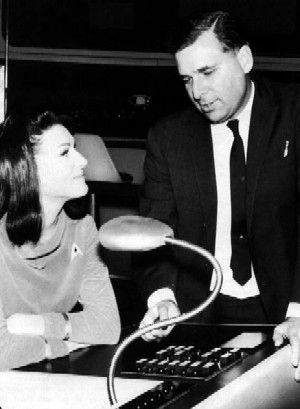|
Gene Roddenberry
He labored his whole life as writer or producer on one second-rate project after another: Gruen Guild Playhouse, Mr. District Attorney, Jane Wyman Theater, Highway Patrol, The Kaiser Aluminum Hour, West Point, Dr. Christian, Have Gun Will Travel, Boots and Saddles, Naked City, Bat Masterson, The DuPont Show with June Allyson, The Detectives, Dr. Kildare, Target: The Corruptors, The Lieutenant , Alias Smith and Jones, Genesis II, The Questor Tapes, Planet Earth, Spectre and Pretty Maids All in a Row. He even kept on churning out second-rate crap from beyond the grave, including such dreck as Andromeda and Earth: Final Conflict. Oh, and he also wrote and produced some 1960s low-budget sci-fi program called Star Trek. Born in Texas but raised in Hollywood, Roddenberry worked as a soldier during World War II, then as an airline pilot and a policeman before realizing his manifest destiny of writing for television with a script for the beloved American classic Mr. District Attorney. For the next 10 years, he worked on a series of mostly forgettable Westerns, police dramas and the occasional sci-fi story.
Once again, the networks weren't especially interested, dismissing the show as "too cerebral." As Roddenberry related it to an assistant, "(CBS) finally told me, 'No, we have a science fiction (show) we like.' And they said it was much more adult than what I was talking about." The show turned out to be Lost in Space. Roddenberry was many things in life, but he wasn't a quitter. He convinced the network to let him shoot a second pilot, a virtually unheard-of strategy at that time. The first Star Trek pilot starred Jeffrey Hunter as Our Intrepid Captain, Majel Barrett (Roddenberry's girlfriend) as Second-in-Command, and Leonard Nimoy as Mr. Spock, a demonic-looking alien. NBC, the only network to give the show a second look, nixed Mr. Spock as unduly Satanic and insisted that Roddenberry drop the female officer. In a move perhaps attributable to artistic integrity, Roddenberry fired his girlfriend but kept the pointy-eared devil. The show was canceled after three seasons, but it was a huge success in syndication, which led to movies, spinoffs and merchandise. It was a slow process, but the show eventually brought wealth and fame to Roddenberry and Barrett (whom he married and eventually re-hired on Trek). Naturally, all this success led to much grousing, complaining and credit-mongering among the million or so people it takes to put out a TV show. Not content to allow Roddenberry the one big success he could claim in his life, everyone from the writers to the producers lined up to claim their role in Trek's success.
Most of these accounts were highly suspect, at least in terms of how large these elements of Roddenberry's personality loomed relative to any other Hollywood producer picked at random. It's hard to find a producer who hasn't taken a beating over "idea stealing," rightly or wrongly. As for egotistical, the man dreamt up a concept that evolved into a multibillion dollar franchise, pulling in some $200 million a year. One might be inclined to cut him a little slack. On the other hand, sometimes it was just hard to like the guy. Roddenberry bitched up a storm when NASA honored his fictional starship by naming the first ever space shuttle prototype Enterprise. Roddenberry was annoyed basically because the space shuttle was a lame piece of crap compared to his imaginary invention. The womanizing charge does seem to have some merit, but no one actually seems to care that much. Much like his leading character, Captain Kirk, Roddenberry was reputed to have a legendary libido with no small amount of success in indulging it, including with actress Nichelle Nichols, who played Lt. Uhura on the show. Majel Barrett is not on the record with any complaints. It's unclear whether this is due to lifestyle choice, denial or disinterest, but the stories are so widespread it's hard to believe they weren't true. In the end, regardless of the endless petty controversies, having "creator of Star Trek" in your obituary is no small thing. Roddenberry died of a heart attack in 1991 at the age of 70. Some of his ashes were blasted into space in 1997; his urnmate was Timothy Leary. Roddenberry was spared the indignity of having them transported on one of those piece-of-crap shuttles, however. They were launched in a Pegasus rocket, an even more primitive vehicle. What an indignity.
|

 Eventually, he turned his attention to creating his own shows, such as The Lieutenant, a program about the Marines which starred Robert Vaughn and
Eventually, he turned his attention to creating his own shows, such as The Lieutenant, a program about the Marines which starred Robert Vaughn and  As the officially sanctioned Roddenberry machine kept churning out happy press releases, the bookshelves were becoming crowded with exposes and tell-all memoirs purporting to tell the real story of Star Trek. Most of these "real stories" involved elevating the roles of everyone but Roddenberry, who was frequently depicted as a tempermental, egotistical, idea-stealing, womanizing jerkoff.
As the officially sanctioned Roddenberry machine kept churning out happy press releases, the bookshelves were becoming crowded with exposes and tell-all memoirs purporting to tell the real story of Star Trek. Most of these "real stories" involved elevating the roles of everyone but Roddenberry, who was frequently depicted as a tempermental, egotistical, idea-stealing, womanizing jerkoff.